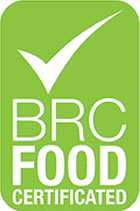BRC Food Grade Certification

The Global Gold Standard for Cold Storage Warehousing
The food industry is a complex and multifaceted one, with various stakeholders involved in the production, transportation, and storage of food products. Ensuring food safety and quality is paramount to the well-being of consumers and the reputation of businesses in the sector. Among the many food grade certifications, BRC (British Retail Consortium) stands out as the top and most recognized certification worldwide. In this blog, we will explore why BRC food grade certification is the global benchmark and discuss the role of warehousing, 3PL (third-party logistics), and cold storage in the BRC certified recognition process.
The Global Leader
BRC food grade certification is a globally recognized standard that sets rigorous criteria for food safety, quality, and operational controls. The certification is based on the BRC Global Standard for Food Safety, which is designed to ensure that certified companies are committed to producing safe, high-quality food products. The standard is applicable to all types of food businesses, from primary producers to storage and distribution companies.
One of the key reasons for BRC's wide recognition is its comprehensive approach, which addresses all aspects of the food production and supply chain. The certification process involves thorough audits and inspections, which are conducted by independent, accredited certification bodies. These audits assess a company's food safety management system, traceability, and hazard analysis, among other crucial factors. By achieving BRC food grade certification, a company demonstrates its commitment to meeting or exceeding the highest standards of food safety and quality.
Warehousing, 3PL, and Cold Storage: Essential Components of BRC Certified Recognition
Warehousing plays a critical role in the BRC certified recognition process, as it involves the storage and handling of food products. Warehouses that achieve BRC food grade certification must maintain strict guidelines for cleanliness, pest control, and temperature management. Additionally, these facilities must adhere to high standards for staff training, record-keeping, and product traceability.
Third-party logistics (3PL) companies often manage warehousing and transportation for food producers and retailers. These providers play a crucial role in maintaining the integrity of the food supply chain. BRC certified 3PL companies must meet the same stringent criteria as food producers, ensuring that food products are stored and transported in a safe and hygienic manner.
Cold storage is another vital aspect of the BRC certified recognition process. These facilities specialize in the storage of temperature-sensitive food products, such as meat, dairy, and frozen goods. BRC certified cold storage facilities must demonstrate rigorous temperature and humidity control, as well as adherence to stringent food safety and hygiene standards.
Conclusion
In summary, BRC food grade certification is the top and most recognized food grade certification worldwide due to its comprehensive approach to food safety and quality. Warehousing, 3PL, and cold storage are essential components of the BRC certified recognition process, as they ensure the safe storage and transportation of food products throughout the supply chain. By achieving BRC certification, these businesses demonstrate their commitment to upholding the highest standards of food safety and quality, ultimately safeguarding the well-being of consumers and the integrity of the global food industry.
Learn more:
Precise Warehousing - Food Grade Warehouse - BRC Certified
Precise Warehousing - Warehouse storage
Find out more about BRC Global standards. Visit their website.